How to become a film director
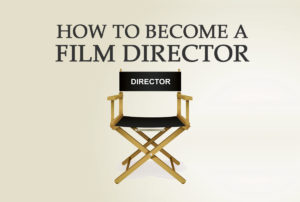
Last week saw the publication of my report 'Cut Out Of The Picture', which looked at gender inequality in the UK film industry. In the process of researching and writing the report, we spoke to over 200 film professionals about how someone becomes a film director. I thought aspiring film directors may benefit from a distillation of what we discovered, so please find below a mix of data and advice.
Our study looked at every film produced in the UK over a ten-year period (2,591 films), and we then conducted detailed interviews with 6% of those directors (121 directors). The career paths detailed below only relate to people who actually directed a feature film in the UK between 2005 and 2014, inclusive.
There is no one route to becoming a film director
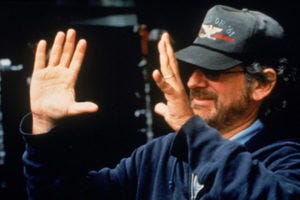
When I started this process, I had hoped to find a small number of clear routes into directing which most people followed. Instead, I found that every director had their own unique career path and as a result it's not been possible to provide a neat summary, the way one would for becoming a lawyer or a doctor. Instead, it's probably more useful to see your route into directing as gathering a collection of skills and experiences which will equip you for the path ahead. You don't have to do any one particular element, but some are unquestionably more useful than others.
In this article, I'm going to focus on what the current crop of film directors have in common, and the advice they themselves would give a new entrant. These are the things you can learn to improve your chances of having a career. However, I would be remiss if I didn't at least briefly mention the things you cannot affect. It's a sad truth that in the current film industry it is hugely advantageous to be white, middle class, male and living in London. While there are no explicit barriers put up against people who fall outside of these criteria, many of the battles they face will be slightly harder. There is currently a lot of talk in the industry about addressing these inequities and hopefully some of this talk will lead to action. Time will tell, but in the meantime, do not be discouraged. There is still a huge amount you can do to improve your chances of getting hired.
The three challenges facing every wannabe director
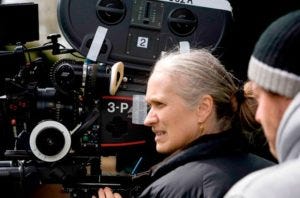
There are no 'necessary' qualifications to becoming a director; you don't have to have a certain level of education, you don't need to pass an entry test (such as the Bar exam for lawyers) and you don't need any kind of professional membership (such as a union card). However, you do eventually need to convince producers, financiers, public funding bodies and other gatekeepers that you're a director worth supporting. This mammoth challenge can be broken down into three smaller challenges...
Get good at the craft of directing
Learn how the industry functions
Get known (and liked) by the gatekeepers
Although these challenges may sound woolly, they are the best summation of how directors get hired. Each person tackles these challenges in a slightly different way and some directors rely on one more than others. For example, some directors focus mostly on their craft, meaning that it takes them longer to get known, but once they are discovered they tend to rise more quickly. Others focus on the way the industry functions, learning the film business and creating a product which sells. Finally, some directors spend their time schmoozing and working their way into the right rooms of financiers and funding bodies.
If you're starting out then consider which of those three best suits your personality - know when you're at your best and try to improve on the area(s) you are lacking in. Which are going to excel at - the art, the system or the people?
The most common paths to becoming a film director
Although the directors I interviewed each took unique journeys into feature film directing, many shared steps along the way. I analysed the routes they took and noted which similarities kept cropping up. The most common paths included studying film on a long course (i.e. at least a year), directing short films and working in some capacity on television or as a crew member on other people's film projects.
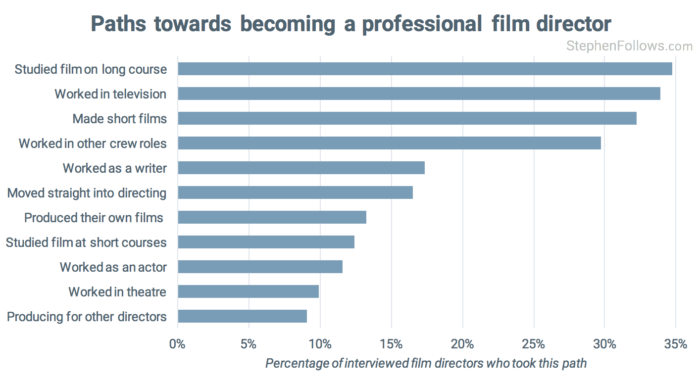
16.5% of interviewed directors said they moved straight into directing, although this was invariably after having worked for a time in another industry. If you hope to go straight into directing without having done anything else before, then I suggest you open your cheque book as you will likely have to pay for your first film's entire budget yourself.
Level of education prior to entering the industry
The current crop of film directors are an educated bunch, with four out of five having at least one university degree. However, only a 29% of those with a degree studied film as their principal subject.
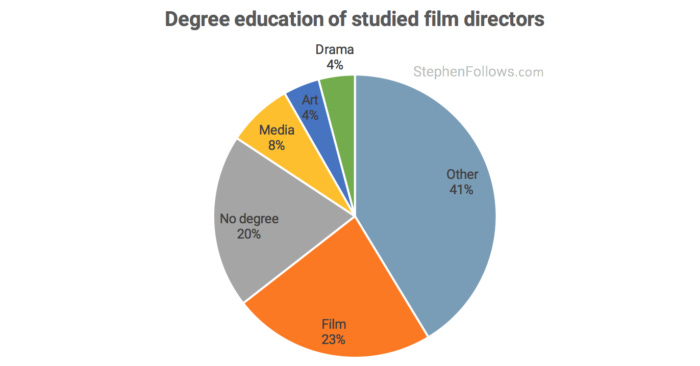
Working in the film and television industry prior to directing
The vast majority of people who become directors do so via entering the industry as a runner, the lowest level job. In the past, I've looked at how film employers find and select their new entrants and as the graph below demonstrates, the most important factor in being hired is 'having a driving license' - so we can add this as a useful qualification when starting your journey towards becoming a film director.
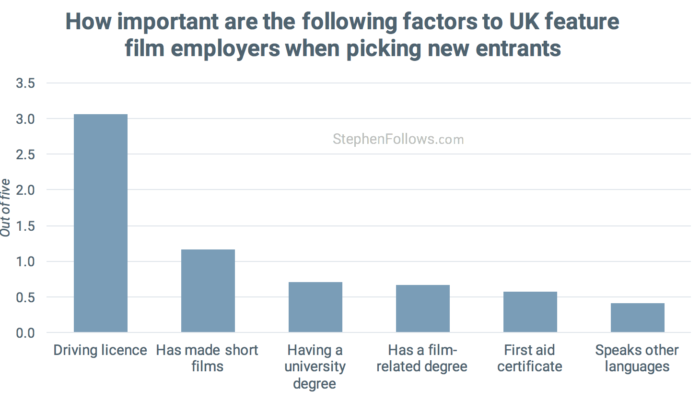
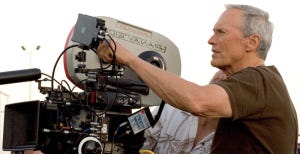
After getting a foothold in the industry, many future directors work their way up to directing via other positions. I asked my interviewees which jobs they held in the film or television industry prior to becoming a film director and received 57 different positions. The most common were (in order)...
17% - Editor
15% - Producer
15% - Camera department
14% - 1st Assistant Director
13% - Production Coordinator
12% - Writer
12% - Actor
Turning your first directing gig into a career
Once you have managed to direct your first film, the battle is far from over. In fact, four out of five people who direct a UK feature film don't go on to direct a second.
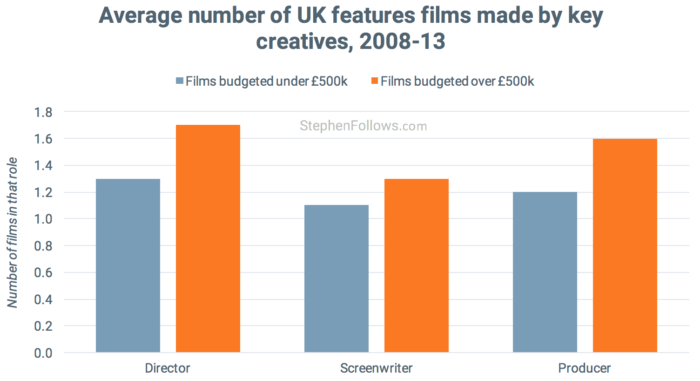
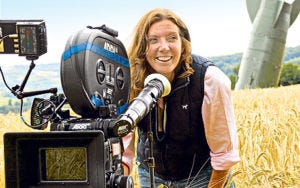
This is due to a number of reasons - not all of which are bad. Some people find that they don't enjoy directing, others are directing purely to promote their other skill (such as writing or acting), while others still forge a successful directing career in television. That said, a fair number of the people who make only one film do not do so purely out of choice.
Therefore, what can film directors do to maximise their chances of turning a one-hit wonder into a fully-fledged career? The answer, according to a 2015 Olsberg SPI report, is to achieve success in one of three ways...
The quality of the film (which the report judged via critical and audience ratings),
Financial performance (i.e. outperform most other films within your budget range)
Build an industry reputation
This means that if your debut film did not wow audiences, critics or your investors, then you need to work to create a 'buzz' around you and your career. The report puts it like this...
...some film-makers can draw ongoing interest from the industry even if their debut film did not perform to above average levels. This is partly due to key UK funders seeking to develop relationships with career film-makers outside of commercial pressures. This can afford a director some degree of insulation from the realities of the performance-led funding approach of the commercial marketplace, instead able to fund a second (and sometimes further films) based on perceived artistic value or latent promise.
In short - be a successful artist, make a profit or just look like a success. Fake it until you make it is a useful mantra in all areas of the business, it seems.
Advice from working film directors
In my interviews with working film directors, the same pieces of advice kept cropping up. Therefore, here are the five most frequently uttered words of wisdom for wannabe-directors, along with some verbatim quotes from directors.
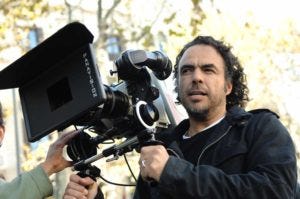
Direct as much as you can - short films, web content, anything you can get your hands on.
Don't wait to be asked, make a short film any way you can.
Direct at least 10 short films lasting around 5 mins, to see if you like it. So many wannabe directors who talk about it for years and finally direct something realises that they didn't enjoy the experience and decide it's not for them. They've just wasted years of their life deluding themselves. You need to be extremely resilient, so if that's not you, don't attempt it.
Ignore trends and what everyone else is doing, and don't waste time mooning over the latest camera. Get out there and shoot things, and make what you want
Focus on making content and getting it out into the world (watching it with audiences) rather than trying to be approved by the big funding bodies. You'll need the funding bodies, but that will come - and it gets easier with allies. Your job as a filmmaker is to connect with audiences - learn what you're doing that works and what doesn't connect - and festivals are unparalleled for that (seeing your work live on big screen with audience).
Just start making,however small your budget and keep on making, the process itself is the best teacher. Live as widely and diversely as possible.
Make and edit as many films as you can about anything using your iphone or any such camera. Editing will make you look at and understand how to tell a story. It will make you realise what you need to shoot to tell that story. It will also make you understand angles and what you can and can't get away with.
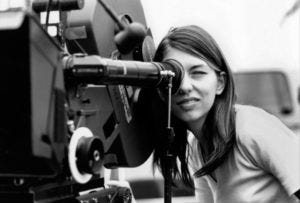
Hone your craft, including by doing related work.
Learn as many aspects of storytelling relative to film/TV as you can (editing, writing, improvisation, script-editing), put yourself in the shoes of an actor even if just once and don't ever wait for somebody else to tell you that you can make a short film, just go out and do it.
Be knowledgeable and learn/be able to use new camera kit & technology (editing & VFX)
Try to work on every field of movie production it helps when you are at the helm and think you know (and you must know every aspect of the trade)
Study and learn all the filmmakers you admire. Study and learn how to communicate with actors. Surprisingly, many directors don't know how to communicate with actors and become focused solely on the camera. Know what you want. Everyone including the cast and crew will appreciate if you step onto set with a clear vision that you can communicate.
Spend time in the edit room before directing. This gives great insight into storytelling and teaches you to shoot what you need to give the editor room to edit without shooting whole scenes over and over from multiple angles.
See as many films as you can, read novels and plays, watch theatre plays, listen to music, be around other directors as an assistant or trainee, try to attend the editing (or at least some days), be open to influences and ideas of other people while perceiving your own identity as a director
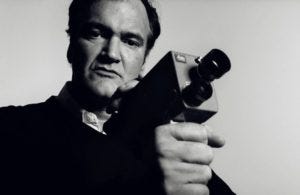
Act like a professional
Always try and keep calm, be on time, plan ahead, and listen to the people around you who have more experience than you. and where possible don’t be afraid to try something new when directing.
Be nice to the crew. They make your film.
Listen and learn. Never assume, always ask. Understand the basics of EVERY department.
Be persistent but patient. Be prepared to do everything with a good attitude no matter how menial! Learn your craft. Watch others do it and don't make their mistakes. Be sure that you really want to do this and have talent (rather than see it as some romantic ego trip).
Spend time getting to know the industry and networking.
Success in this field is reliant on who you know as much as what you know, unfortunately!
Network network and network some more ... knowing people trumps ability ... if you know people and have ability, fantastic you'll go a long way!
Collaborate, form collectives, build relationships with other people wanting to do the same things. Find amazing camera people, editors, art directors, set builders, composers, writers, actors, artists, graphic designers. Collaborate, don't think you have to do everything yourself. Build teams. Have a laugh. Work hard.
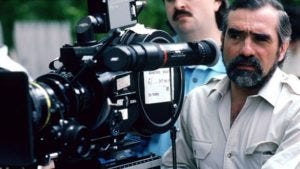
Never give up despite how hard and depressing it can seem at times.
Never give up! Seek help from those already in the industry as early as you can if you are working on your own film. People are really helpful and generally want to help. Use them to look at rough cuts and test ideas on storytelling.
Be prepared to be poor, rejected but if you love it, don't let anything stop you.
Know what you're doing it for: the cash & fame or the art & soul.
Have tenacity, have a means of financial support, stay true to the vision and don't get distracted, be aware of your own talents and don't kid yourself - self evaluation is key. Set a goal to make one brilliant short a year until you get there
Make your own films and be prepared to give up absolutely everything else in your life if you expect to finish a film.
Don't give up! Seek out mentors and work with the best/most talented/most inspiring people possible.
Don't take no for an answer If you can't handle rejection or criticism do something else You'd better be in it for the long haul You never stop learning Get to know rich & well connected people Don't give up
Epilogue
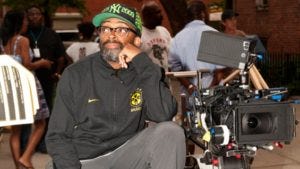
It's worth noting that this article represents the career journeys of current film directors, meaning that it reflects the film industry as it is now, not as it may be in the future. If you are an 18 year-old currently struggling to work out what path to take to become a professional film director then bear in mind that, if you're successful, the industry you work in could differ from the industry illustrated above. For example, no-one we interviewed stated that they got into professional directing by running their own YouTube channel, and yet I have no doubt that some of the current YouTube superstars could turn their hand to directing quite successfully.
So take this advice as guidance only. If you see new routes opening up then don't ignore them just because they were not listed above. When film is at its very best it's about taking risks, doing something new and constantly innovating.


